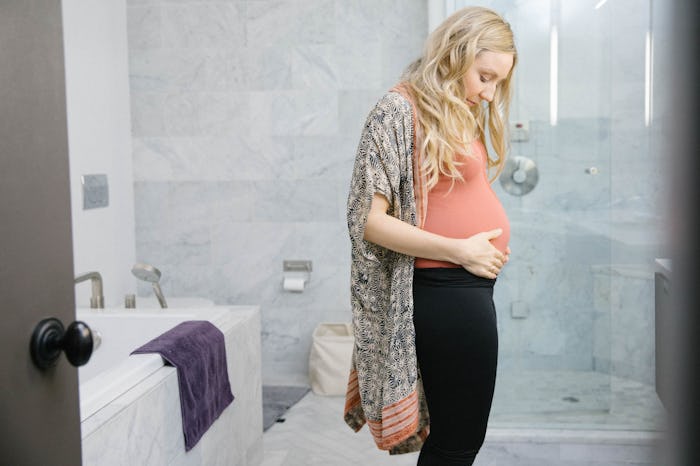Life
Here's How Pregnancy Stress Can Impact Your Baby, According To Experts
I don't know about you, but my pregnancy was stressful. I worried about my health, my baby's health, finances, my relationship, how a baby would change my life, and, well, you get the idea. Pregnancy hormones didn't help either, mind you, so coping with all that stress wasn't easy. So I would be lying if I didn't ask my doctor, "How does stress affect your baby?" a time or two. What made matters worse, unfortunately, was that the answer actually stressed me out. Yay pregnancy, right?
According to the March of Dimes, while a little stress during pregnancy is normal and to be expected, too much stress can impact your health during pregnancy, which could then translate to an impact on your baby's health, too. If you can't get your stress under control it can lead to high blood pressure, for example, which can cause your baby to be born prematurely or at a low birth weight. The March of Dime's website goes on to say that a significant amount of stress during pregnancy can impact your baby's development and cause lasting problems for your baby during childhood, including attention deficit issues and anxiety. So if you've ever wondered why pregnant women need a boatload of support, encouragement, and understanding during 40 (more or less) weeks of gestation, there's your damn answer.
So, how does stress impact your baby in utero? According to Dr. Elysia Davis, a researcher at University of Denver, when a person experiences stress their brain releases the hormone cortisol. When this happens during pregnancy, and your baby is exposed to higher levels of cortisol, it can impact their brain development. Her research shows that babies whose moms had higher levels of cortisol early in pregnancy had slower rates of cognitive and motor skills development during their first year of life. Other research published in the journal Stress showed that pregnancy stress can have lasting negative impacts on your child's behavior later in childhood, too.
Additional research published in the Proceedings of the National Academy of the Sciences shows that stress in early pregnancy can actually change the way your baby's brain develops in the womb. When researches measured the amygdalas — the part of the brain responsible for fight or flight reactions during crisis — in healthy 7 year olds whose mothers experienced stress during pregnancy, they were larger than those whose moms didn't experience stress. This is important because these children are at risk for mental illness.
The American College of Obstetricians and Gynecologists (ACOG) recommends OB-GYNs and other health care providers screen women for stress and mental health issues throughout their pregnancies. They encourage pregnant women to identify what's causing their stress and use coping techniques like relaxation, eating a healthy diet, and finding social support. As always, you should talk with your doctor or midwife, if you can't cope with stress during pregnancy.
